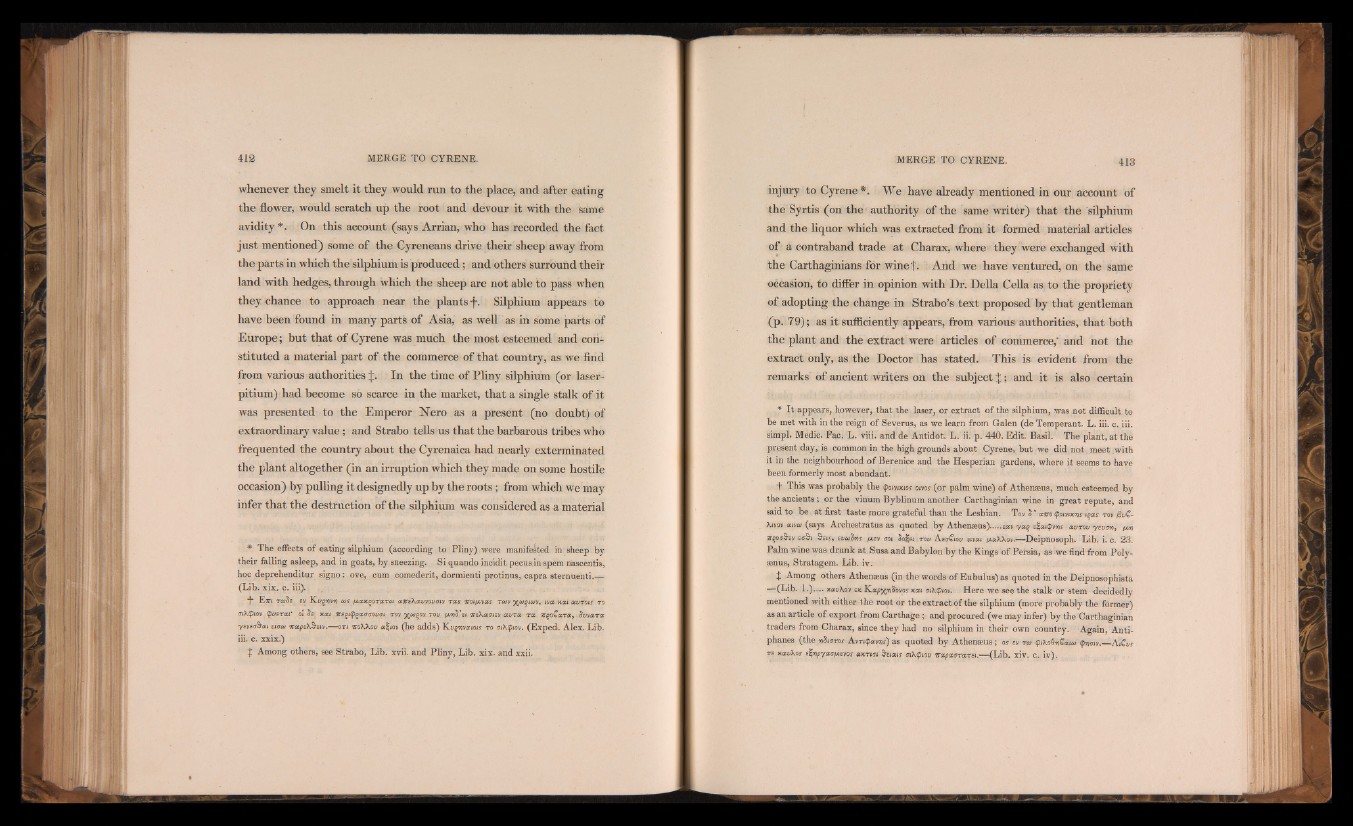
whenever they smelt it they would run to the place, and after eating
the flower, would scratch up the root and devour it with the same
avidity*. On this account (says Arrian, who has recorded the fact
just mentioned) some of the Cyreneans drive their sheep away from
the parts in which the silphium is produced; and others surround their
land with hedges, through which the sheep are not able to pass when
they chance to approach near the plants f. Silphium appears to
have been found in many parts of Asia, as well as in some parts of
Europe; but that of Cyrene was much the most esteemed and constituted
a material part of the commerce of that country, as we find
from various authorities £. In the time of Pliny silphium (or laser-
pitium) had become so scarce in the market, that a single stalk of it
was presented to the Emperor Nero as a present (no doubt) of
extraordinary value; and Strabo tells-us that the barbarous tribes who
frequented the country about the Cyrenaica had nearly exterminated
the plant altogether (in an irruption which they made on some hostile
occasion) by pulling it designedly up by the roots; from which we may
infer that the destruction of the silphium was considered as a material
* The effects of eating silphium (according to Pliny) were manifested in sheep by
their falling asleep, and in goats, by sneezing. Si quando incidit pecus in spem nascentis,
hoc deprehenditur signo: ove, cum comederit, dormienti protinus, capra sternuenti.-e-
(Lib. xix, c. iii).
f Ewt ta/5e ev Kugnvn cos ftotxqorotrco ocsre\avvovaiv rots oroiftvocs rcov y^cogtatv, ivot xoti a v ro is t o
oiXipm cpoerocr ol 5e. xoct Hegilpgocaaovcrt roc yjoQOx too jjycio’et 7CE\t<jict clvtcl roc f fg o C a r a ,
yeyetr&ai Eiaco otapoK^oiv.— or* TioXkov aStov (he adds) ICcgnvaiois ro <riX<ptov. (Exped. Alex. Lib.
iii. c. xxix.)
t Among others, see Strabo, Lib. xvii. and Pliny, Lib, xix. and xxii.
injury to Cyrene*. We have already mentioned in our account of
the Syrtis (on the authority of the same writer) that the silphium
and the liquor which was extracted from it formed material articles
of a contraband trade at Charax, where they were exchanged with
the Carthaginians for winef. And we have ventured, on the same
occasion, to differ in opinion with Dr. Della Celia as to the propriety
of adopting the change in Strabo’s text proposed by that gentleman
(p. 79); as it sufficiently appears, from various authorities, that both
the plant and the extract were articles of commerce,' and not the
extract only, as the Doctor has stated. This is evident from the
remarks of ancient writers on the subject J ; and it is also certain
* It appears, however, that the laser, or extract of the silphium, was not difficult to
be met with in the reign of Severus, as we learn from Galen (de Teraperant. L. iii. c. iii.
siinpl. Medic. Pac. L. viii. and de Antidot. L. ii. p. 440. Edit. Basil. The plant, at the
present day,' is common in the high grounds about Cyrene, but we did not, meet .with
it in the neighbourhood of Berenice and the Hesperian gardens, where it seems to have
been formerly most abundant.
"Y This was probably the tpoiyixios om s (or palm wine) of Athenaeus, much esteemed by
the ancients; or the vinum Byblinum another Carthaginian wine in great repute, and
said to be at first taste more grateful than the Lesbian. Tov '$’ airo (pomxm i%as tov $vQKtvov
aiveo (says Archestratus as quoted by Athenaeus) exv yaq eZaKpvw aurov yevan,
irgoaSey sffB’i S s ís y /asv <ro» So£et .roo AsaGiou m a t /xaAXov.—Deipnosoph. Lib. i: c. 23.
Palm \vine was drunk at. Susa and Babylon by the Kings of Persia, as we find from Poly-
senus, Stratagem. Lib. iv.
Í Among others Athenaeus (in the words of Eubulus) as quoted in the Deipnosophista
—(Lib. 1.).... xaifXov, ex Ka^^^ovoy xai crtX(ptov. Here we see the stalk or stem deeidedly
mentioned with either the root or the extract óf the silphium (more probably the former)
asan article of export from Carthage; and procured (we may infer) by the Carthaginian
traders from Charax, since they had no silphium in their own country. Again, Anti-
phanes (the pharos Avritpaws) as quoted by Athenaeus; os- sv rco <ptXodnCaico (pnmv.—AiCvr
re xa.v'kos e%npyot<riA¡evos axrm Seiuis mXipiou wapotararei.—(Lib. xiv. c. iv).